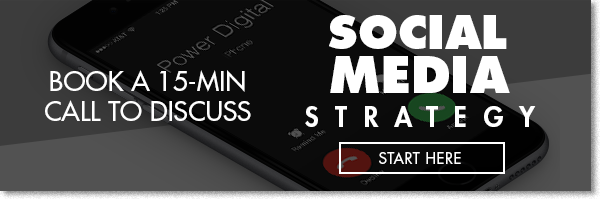How to Get the Most Out of Your Facebook Retargeting

By now you know what retargeting is and how it’s typically your top converting campaigns or ad sets on Facebook.
….and that’s because you know that people that have already been to your website already know and recognize your brand. Now you need to continue to follow up with users based off of very segmented messages.
Retargeting is the modern follow up. And when done not so…well creepy… it can be extremely powerful.
No Clicks Remain Equal
One thing I want you to understand is that all clicks are not created equal.
Let’s pretend you are marketing Power Digital’s internal brand (marketing B2B is extremely hard and requires a robust customer journey but this is for the sake of example).
What type of prospect is going to be easier to close?
…Someone that knows they need internet marketing? Or someone that has no clue whether they need digital but you want to reach out to these colder prospects to try and convince them that they do need digital marketing?
The person that already knows that they need internet marketing is going to be much easier to close because they know they want it. There’s a level of awareness and intent there that has already been developed.
Related: Facebook Traffic and the Buyer’s Cycle – Best Practices
…It’s going to be much more difficult to close someone that has no idea what digital marketing is. You need to raise the level of awareness of not only the product category, but the brand too. That’s a huge extra step in your sales process.
That’s what happens when we target cold traffic on Social. They are on Facebook for pleasure, there’s no intent for your product when they are on their app.
So what can you do to capitalize off of high intent traffic that already knows what they want? And what are you going to do to move those users down your sales cycle?
Well, the quickest win is to pull up Google Analytics and identify users that were introduced to your brand via search channels.
Pulling Up Google Analytics
Open up your Google Analytics and browse to the acquisition report and click on channels.

Next look at the channel groupings: we recommend looking at Organic, Paid Search, and occasionally Direct since there was some sort of search there.

Identify Non-Branded Organic Traffic
Let’s say you click on Organic Search.
Go segment your secondary dimension as “Landing Page”. This is going to show you all the top landing pages that users are hitting when being introduced to your site.
…Next click on “advanced” and search the dimension “Keyword.”
Related: Is Facebook’s Audience Network Wasting Your Ad Dollars on Bot Traffic?
“Exclude” Keyword and enter variations containing your brand’s name and common misspellings to remove any branded traffic. Removing branded traffic will ensure that we always drive new users into our cookie pool as we retarget.
![]()

Cool – one of our top organic ranking pages is a Facebook audience network post.
The idea is that users find that post because they are seeing really poor quality traffic from the audience network. They searched that and have a big problem. We put together a compelling case to help provide solutions to their problem.
That is a great brand introduction to us. Users have a problem but don’t know who Power Digital is. We are the ones that are going to help them solve their problems. We build trust with these people.
Create Your Audience
Okay so let’s pull the Facebook Audience Network URL as an example and plug it into an audience on Facebook.
Go to the Audience Tab and click on “People who visit specific pages.”
I prefer using URL contains, so in this case I’m putting “Facebook-audience-network” (I don’t have any other URLS containing this so I can stay a little broad when using a “contains” statement).

Rinse and repeat this process with multiple timeframes. 30, 60, 90 days etc… The more recent the time frame, the closer the user is to the sale.
Choose Your Objective
Okay now ask yourself – what’s the goal am I trying to achieve? Am I trying to retarget people to an email sign up? A blog post? Maybe a phone call? We can achieve all these things with using different objectives on Facebook.
Related:Using Facebook Retargeting Ads
In our case, we wanted to test a new Facebook messenger ad. And again, we had a Facebook Audience Network post that was driving a good amount of high intent search traffic. Therefore, we wanted to provide an experience in which we could further help the user that read the blog post.

Take Them To The Next Step
Once you choose your campaign objective, drop in your audience under the ad set level. It should look like this.

Next we went and made our messenger ad.

Wrapping Up
There are some cool ways to leverage other channels in your paid social strategy. In this particular case, someone had a problem and we solved it.
That’s a great introduction to your brand, from there we used a messenger ad to bring potential prospects offline.
We then get them on the phone and take it from there.
Our Editorial Standards
Reviewed for Accuracy
Every piece is fact-checked for precision.
Up-to-Date Research
We reflect the latest trends and insights.
Credible References
Backed by trusted industry sources.
Actionable & Insight-Driven
Strategic takeaways for real results.






